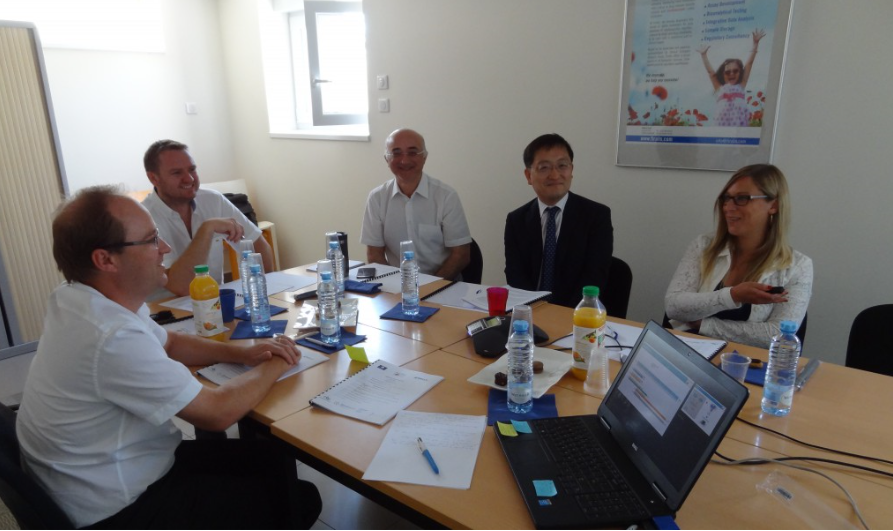A RAPID DIAGNOSTIC TEST TO PREDICT HEART FAILURE AFTER ACUTE MYOCARDIAL INFARCTION
On 24 March 2017, the EU-funded (Eurostar) HeartLinc program is launched in Seoul, South Korea, during a first meeting between the Seoul National University Hospital (SNUH), the QuantaMatrix (Seoul, South Korea) and Firalis. The project is ranked 1st in South Korea and 2nd in Europe, therefore awarded €3.2 million funding by Eurostar.

On 17 June 2017, the collaboration kicked off together with the European partners: Centre Hospitalier Universitaire (CHU) of Toulouse (France) and SimplicityBio (Monthey, Switzerland). In the frame of this €3.2 million research program, the consortium will develop an innovative in vitro diagnostic (IVD) test to assess the risk of developing heart failure (HF) after Acute Myocardial Infarction ("AMI"). The test will be based on a unique profile of long non-coding RNAs ("lncRNA").
Profiling of AMI patients will be done on 3353 cardiac enriched lncRNAs using FIMICS, a long non-coding RNA panel to better characterize cardiac disorders and toxicities.
Read more on FIMICS here!
AMI is a leading cause of mortality worldwide, often caused by the development of HF after myocardial infarction (MI). In the EU and the USA, there are 2.2 million AMI patients each year. Up to 30% of AMI patients will develop HF during the five years following the infarction and more than 50-70% of the patients die within five years after diagnosis. In East-Asia, the prevalence of HF ranges from 1.3% to 6.7% throughout the region and is expected to increase during the next decades. By 2040, more than 1.7 million Koreans are expected to have HF. Preventive therapy has shown to be effective by slowing down the progression of the disease in those patients that go on to experience heart failure. However, such intervention requires that patients at risk are identified early.
The potential for lncRNAs in disease prediction, therapeutics, and companion diagnostics is widely recognized by the scientific community and the diagnostic industry. Despite the potential, no lncRNA-based products have been commercialised yet. Therefore, new lncRNA-products would be considered as a breakthrough development, strongly stimulating the field of lncRNA-based research and development.
In this project, the consortium will develop an innovative in vitro diagnostic (IVD) test to assess the risk of developing HF after AMI. “The SNUH is very glad to contribute to this intercontinental project on a key pathology” said Hae-Young Lee, Associate Professor of Seoul National University Hospital. The medical benefit of the IVD test will be validated in blood samples of European and Asian AMI patients. “We are now in a position to confirm the performance of our HEARTLINC IVD test simultaneously in Asia and in Europe” said Hüseyin Firat, CEO of Firalis.
The HeartLinc project will deliver an IVD test suitable for fast, multiplex, and high throughput HF prediction. This test will be an entirely new product and a breakthrough development. It will address an unmet medical need by identifying AMI patients at risk for HF, hence, allowing early treatment and monitoring treatment response. This is of particular importance in context of recently approved innovative drugs, such as Entresto.
The HEARTLINC test will be available on an innovative multiplexed platform called Fi-MAP. This CE marked IVD platform has been developed by the innovative SME partner from Seoul, the QuantaMatrix. “Our proprietary technology will enable to show the use of FiMAP platform in the field of gene expression analysis and generation of IVD products” said Sunghoon Kwon, President & CEO of QuantaMatrix.
In order to reduce the incidence of HF, the HeartLinc test will help clinicians to apply a personalized treatment suitable for each individual patient. A predictive model will be established integrating the data from divers sources including clinical, biological and imaging data. SimplicityBio has developed new bioinformatics tools to discover and increase the performance of predictive models. “We are very happy to be part of the HeartLinc consortium developing the first precision medicine tool for the prediction and the management of AMI-induced heart Failure” said Dr. Matthew G. Hall, the founder & CEO of the company.
Heartlinc test will allow a more effective treatment and a drastic reduction of the burden of HF on healthcare systems.
***
Clinical Context of use : Identify patients at highest risk for heart failure who may benefit from early intervention, enhanced monitoring, or transition to advanced therapies.
The HEARTLINC test is an entirely new product and a breakthrough development. The test is an innovative in vitro diagnostic (IVD) test based on a unique profile of long noncoding RNAs (lncRNA). The test was developed on multiple robust patient samples from different cohorts and its medical benefit is currently being validated in blood samples of European (150 patients in CHU Toulouse France) and Asian (150 patients SNUH, Seoul South Korea) AMI patients.
The novel HEARTLINC IVD test is the first of its kind in cardiovascular diseases and addresses an unmet medical need to identify AMI patients at risk for Heart Failure to allow for personalized patient care and management.
The HEARTLINC product incorporates various innovative elements:
- First blood-based test for prediction of HF in AMI patients;
- Minimal invasiveness, requiring only a small volume of blood;
- Based on novel cardiac enriched lncRNAs;
- Does not require dedicated personnel and specialized hardware;
- Can be performed in any standard clinical laboratory.
Participants:
Firalis S.A. (Project Coordinator)
Firalis is a life sciences company, creating novel values via biomarker discovery, development and regulatory qualifications; to establish an internal portfolio of biomarker-based diagnostic methods and to provide customized biomarker solutions. Firalis is active in the field of drug safety, cardiovascular, inflammatory, neurodegenerative and autoimmune diseases. The company has been awarded with several national and international prizes for its innovative approaches. Firalis Group is certified ISO 13485 and ISO 9001 for the development and production of CE-marked assays and certified ISO 17025 for testing laboratory.
Firalis SA, 35 Rue du Fort, 68330 Huningue - FRANCE
+33 389 911 320-8 / www.firalis.com / sales{@}firalis.com
Seoul National University Hospital (SNUH)
SNUH is the main centre of expertise in cardiology and has extensive expertise on clinical trials in the field of cardiovascular disease in South-Korea. SNUH is at the forefront of improving not only the nation’s healthcare but also global medicine through its network of following hospitals: SNU Bundang Hospital, SMG-SNU Boramae Medical Center, SNUH Healthcare System Gangnam Center, and Sheikh Khalifa Specialty Hospital (SKSH), located in the United Arab Emirates (UAE).
Centre Hospitalier Universitaire (CHU) de Toulouse
At the heart of the largest region of France, the Centre Hospitalier Universitaire (CHU) of Toulouse is the health facility reference of this region which includes 196 public and private hospitals. Consisting of several sites across the north and south of the city, the Toulouse University Hospital is the largest employer in the Midi-Pyrenees region, fulfilling its mission of care, prevention, education and research. Its activity is also driven by the meshing of scientific collaborations between hospital practitioners and academic research teams from INSERM, CNRS, INRA, EFS.
QuantaMatrix
QuantaMatrix is a global personalized diagnostics company founded in 2010 and located in Seoul, South-Korea with a professional and commercial network in Asia. The company is an expert in developing and commercialising diagnostic assays. QuantaMatrix commercializes molecular and cellular diagnostic services enabled by proprietary instrumentations and disposable kits developed in-house.
QuartzBio (former "SimplicityBio")
SimplicityBio is an in-silico biomarker discovery company, identifying robust biomarkers for diagnostics and prognostics with its proprietary algorithms and technology. SimplicityBio collaborates with biotechnology and pharmaceutical companies to create robust models combining biomarkers panels based on omics and clinical data, with humanly interpretable rules. These unique models bring new molecular diagnostic tests to the market and enable patient stratification to develop more effective drugs.

